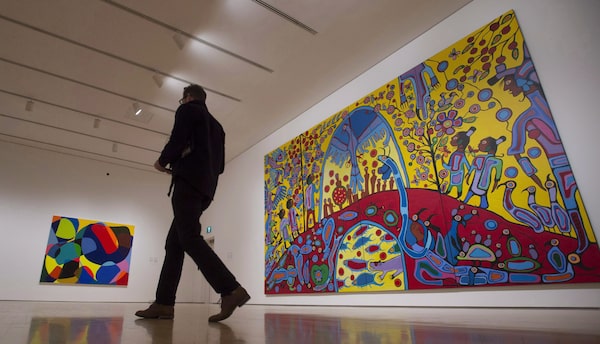
A reporter walks past 'Androgyny' by Norval Morrisseau, right, and 'Tweaker' by Lawrence Paul Yuxweluptun at the National Gallery of Canada's contemporary art galleries, in Ottawa on May 2, 2017.Adrian Wyld/The Canadian Press
A man who played a key role in a wide-reaching case of art fraud involving Norval Morrisseau’s paintings was handed a five-year sentence on Thursday, with the judge saying the crime had tarnished the legacy of the renowned Indigenous artist.
Gary Lamont, 61, pleaded guilty earlier this month to two charges related to the discovery of hundreds of fraudulent artworks sold under Mr. Morrisseau’s name. Some of those forgeries, created in the artist’s distinctive Woodland School of Art style, were on display in a Thunder Bay, Ont., courtroom during Mr. Lamont’s sentencing.
“This is more than just an art fraud, it’s an appropriation of a cultural and spiritual identity of one of Canada’s most loved and valued artists,” Justice Bonnie R. Warkentin said as she sentenced Mr. Lamont to what will amount to four years behind bars, when time already served in custody is factored in.
“The purpose of the creation of these fake paintings was to gain an economic benefit, but in the course of creating and selling these fakes the legacy of Norval Morrisseau has been irrevocably damaged,” the judge said. “His spirituality has been undermined and tarnished.”
Mr. Lamont, who pleaded guilty to knowingly making a false document and defrauding the public in an amount exceeding $5,000, briefly addressed the court.
“I’m very sorry and remorseful for what I’ve done and I take full responsibility,” he said.
Court heard that Mr. Lamont had personally known Mr. Morrisseau, who died in 2007, for 30 years and that the artist had occasionally given him some of his original artwork.
But from 2002 onward, Mr. Lamont oversaw production of “hundreds of artworks” that were falsely attributed to Mr. Morrisseau and that carried forged signatures associated with the artist, court heard.
Mr. Lamont’s lawyer said that his client did not have the “mechanical or technical skills” to add forged signatures to paintings, but acknowledged that could have been done “at his direction.”
An agreed statement of facts read in court said the forged artwork was sold directly to individuals, collectors and art galleries from 2002 to 2015. It said investigators have so far confirmed 190 forgeries among the works seized by police, and an “unknown number” of fake paintings remains in circulation.
Court also heard on Thursday that although Mr. Lamont does not have a history of financial crimes, he has a “lengthy” criminal record that includes convictions for drug trafficking and sexual assault.
In March, Ontario Provincial Police announced that eight people had been arrested in the fraud investigation and that more than 1,000 allegedly fake paintings, prints and other artworks were seized in the probe that had gone on for 2½ years.
Police said at the time that those arrested faced a combined 40 charges, including forgery, and that five of the eight suspects were residents of Thunder Bay. Court heard on Thursday that charges against one of those suspects were withdrawn.
Mr. Morrisseau, also known as Copper Thunderbird, was a trailblazer for contemporary Indigenous artists across Canada. He had received numerous awards and honours, including the Order of Canada, and had a “profound influence” on the international art world, court heard.
The Morrisseau estate said in a statement read in court that in addition to the massive financial toll of the fraud, the emotional toll is “immeasurable.”
“The alternate reality created by this crime has infiltrated every facet of society, tarnishing the reputation of Norval Morrisseau’s family and estate,” the statement said, adding that the crime has “profoundly” disrupted the lives of his family members.
The estate said the flooding of the art market with Morrisseau fakes diminished the value of his original paintings and that estimated losses in the estate’s worth “surpass a conservative estimate of more than $100 million.”
The Crown did not seek restitution for the victims of the art fraud, saying it would be unrealistic to expect Mr. Lamont to pay it as he’ll be incarcerated and unable to work.